Tony Brock was born in Poole on 31st March 1954 and attended Longfleet Primary School before progressing onto Henry Harbin School (now Poole High School). He initially took up the guitar like most kids during the sixties, but when he was approached by two guitar playing school friends, Gary Margetts and Steve Evans, to join their group in 1968, he switched to drums. The line-up of what was to become Transit Sound was completed by Gary’s younger brother Tristain after he was persuaded to take up bass. The group regularly played at their local hangout and rehearsal space, the Oakdale Boys Club and outlying village halls and youth clubs in the surrounding area, or any venue that didn’t serve alcohol, as they were still in their early teens. In the summer of 1970, Steve Evans was ousted and the slimmed down trio made their debut at the annual ‘Bournemouth Regatta Beat Group Competition’ on Saturday 15th August 1970. Despite the inclement weather, they beat off the competition and received the trophy from Radio One DJ, Pete Murray.

A fifteen year old Tony Brock in Transit Sound (Photograph Spontaneous Combustion Facebook).
The band signed with manager John House and was taken under the wing of fellow Oakdale resident Greg Lake, who was forging a successful career with King Crimson Emerson, Lake and Palmer. Greg pulled a few strings by introducing the band to EMI’s Nick Mobbs, who signed them to the new subsidiary label Harvest, an imprint specifically launched for up-and-coming progressive bands and already home to big hitters Pink Floyd and Deep Purple. He also offered to produce their debut album and gave the band a new name, Spontaneous Combustion, after a Cannonball Adderley number.
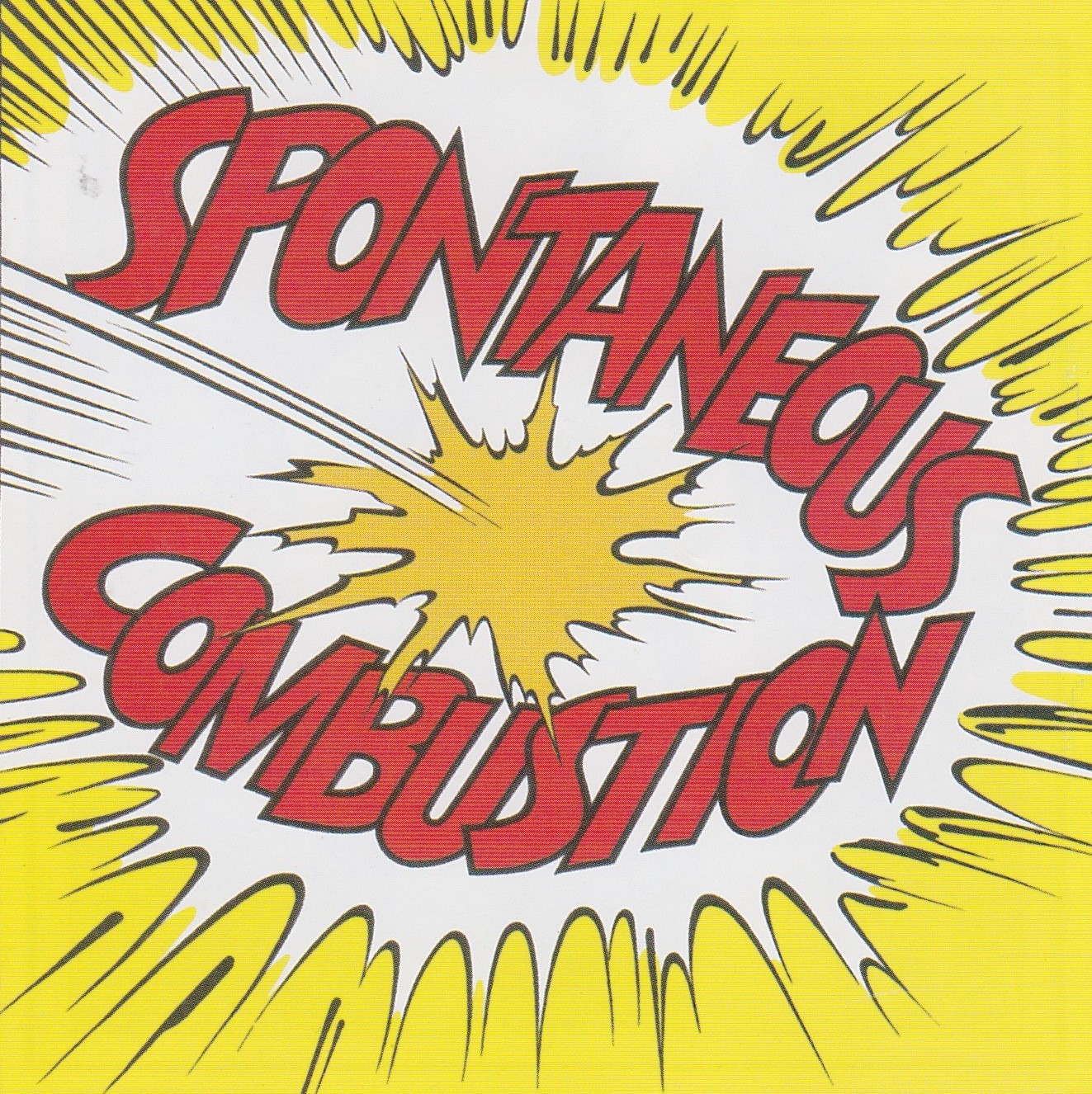

Their first recorded output was a three track single in November 1971, which included two cuts from their soon to be released album, “200 Lives” and “Leaving”, plus a standalone track, “Lonely Singer”. The self-titled album followed in January 1972, housed in a lavish comic book style sleeve designed by Paul May. The six progressive rock work outs, failed to impress most music critics and sales stayed stubbornly low, but even so the record gained a release in America on the Capitol label with a far less striking sleeve.
For their sophomore effort, Triad, released in October 1972, the band utilised the knowledge they had gleaned from Lake and produced the record themselves. This time out, the band employed a heavier approach with meatier production values, giving the album a hard rock edge. Despite the improvement, Sounds criticized its lack of heart and soul and bizarrely labelled it a “Liberace / Deep Purple hybrid”. Triad appeared along with a non-album single, “Gay Time Night”, written by Chris Redwood from local band Almanak and featured an arrangement and production by Robert Kirby who famously worked with the enigmatic singer / songwriter Nick Drake. But like all their other records, it failed to garner much interest.
In January 1973, a third and final UK single showcased two different versions of Aram Khachaturian’s most famous work, “Sabre Dance”. The A side cloned Love Sculpture’s top ten hit from five years previous, while on the B side, the same tune received a complete overhaul with the help of another south coast luminary, one R. Fripp Esq. Apparently Fripp and the band spent a week in the Margetts family home in Nansen Avenue, whipping the arrangement into shape before committing it to tape. Two months later, an American only single, “Rainy Day”, was released in March 1973. The A side was plucked from Triad while the non-album flip, “Chessboard”, another composition from the pen of Chris Redwood, listed Robert Kirby as the producer. One can only guess that it was recorded at the same session as “Gay Time Night”.
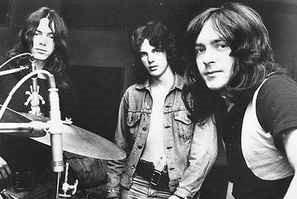
Spontaneous Combustion, Left to Right: Tris Margetts, Gary Margetts & Tony Brock (Photograph Spontaneous Combustion Facebook).
In the spring of 1973, Tony Brock concluded that Spontaneous Combustion had gone as far as it could and relocated to London to find fame and fortune with former Room drummer Bob Jenkins, who was also looking to further his career. He found gainful employment in the rock / blues outfit Strider where he joined guitarist Gary Grainger, bassist Lee Strzelczyk, organist Ian Kewley and vocalist Rob Elliott replacing their original drummer, Jimmy Hawkins. Together the quintet recorded the group’s third single, “Seems so Easy” and second album, 1974’s Misunderstood, a rousing, high octane rock opus that compared favourably with other bands of the same ilk such as Humble Pie and Bad Company.

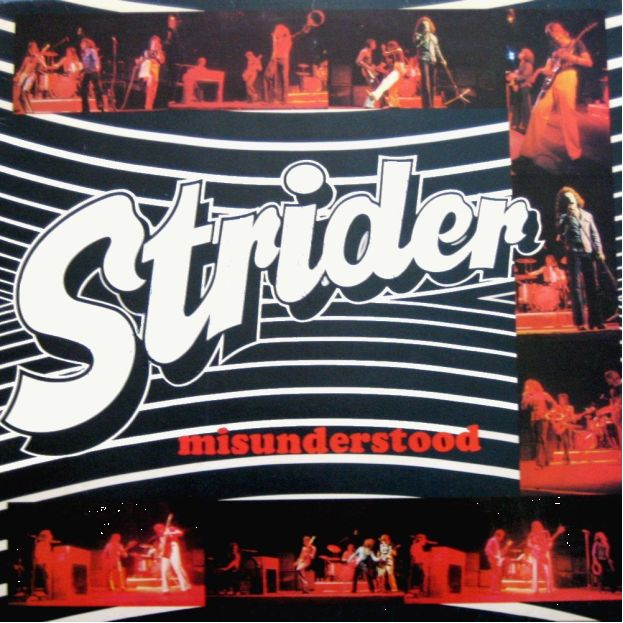
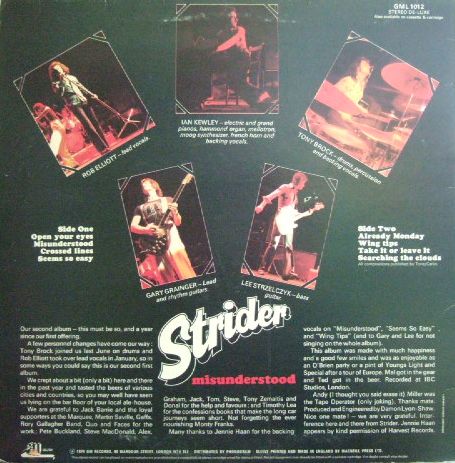
Unlike Pie and Company, their records didn’t translate into sales but, like their peers, they were at home on stage where their rowdy, booze fuelled shows appealed to audiences who were in the same sozzled state. Months spent slogging around the country supporting Rory Gallagher and Status Quo, or headlining shows in their own write, paid off as they won a small but loyal fan base. The band were a regular draw at the Marquee Club in London, which gained them a spot low down on the bill at the ‘14th National Jazz, Blues & Rock Festival’ in Reading because the event was organised by Harold Pendleton, the club’s owner. They appeared on a blustery, rainy Sunday with Focus, Barclay James Harvest, Steve Harley, Chapman, Whitney Streetwalkers, and the incongruous George Melly and the Feetwarmers. I’m not sure how well the rotund, camp jazz singer went down with a rock crowd prone to bottling off acts they didn’t like, but Strider had no such worries as their performance turned into a riotous occasion climaxing in Ian Kewley dowsing himself in his own piss after taking an ill-judged leak off stage into a gust of wind. He then finished the set by hurling his keyboard into the crowd.
In November 1974, Strider joined forces with The Faces on their farewell UK tour, calling in at the Bournemouth Winter Gardens on the 6th December. However, Strider also broke up the following year when Rod Stewart poached Gary Grainger for his new band after closely watching the guitarist during the run up to Christmas. As for Tony, he joined keyboard player and guitarist Michael Corby, bassist / vocalist John Waite, manager Adrian Millar and soon to be recruited guitarist Wally Stocker in a new, but as yet unnamed project.

The Babys circa 1976, Left to Right: Michael Corby, John Waite, Tony Brock & Wally Stocker (Photograph unknown).
Initially christened The Babys as a joke, the name stuck as the group took their first tentative steps around the clubs of London, before undertaking a ten day promotional trip to America from which they never returned. Preferring to set up base in their adopted home away from the din and clamour kicked up by the burgeoning punk movement back in Blighty, they recorded their self-titled debut album in Toronto with producers Brian Christian and Bob Ezrin. The rather bland affair only just scraped into the US Billboard top 200 and their first single, “If you’ve Got Time”, fared no better despite heavy rotation on the radio and an appearance on Dick Clark’s American Bandstand. For their follow up, Broken Heart, they relocated to Los Angeles, picked up a new producer in Ron Nevison and improved on the template hinted at on their debut with a set of catchy, tightly arranged pop songs performed with rock ‘n’ roll grit and a dash of soul. The lead single, “Isn’t It Time”, showcased a soaring vocal by John Waite, lush orchestration, punchy horns and a catchy chorus driven by back-up female vocal trio, the Babettes. It climbed to number thirteen in the US, number one in Australia and a lowly forty five in the UK, the best placing the group achieved in their homeland. The follow up “Silver Dreams”, a Brock composition, stalled at a disappointing fifty three.


The climate back in Britain wasn’t right for their brand of AOR, so the band honed their sound specifically for the American market while sharing bills with Cheap Trick, Journey, and other like-minded acts. However, schisms appeared in their ranks while recording their next album, Head First. Mike Corby continuously argued with the rest of the band over the old perennial chestnut, “musical differences”. Sensing an unsettling atmosphere brewing in the studio, the record company took matters into their own hands by staging a coup in which Waite, Stocker and Brock took over the running of the band and Corby, along with original manager Millar, received their marching orders. While Corby threatened to sue Chrysalis for instigating his removal, the remaining trio salvaged what they could from the original sessions and cut a further six songs for the album. Because of the difficult gestation period, the record had a slightly schizophrenic feel with tracks such as “White Lightning, You (Got It)” and their number thirteen hit, “Every time I Think of You”, receiving a sugary string treatment, while “Love Don’t Prove I’m Right”, “Run to Mexico” and the second single, “Head First”, ploughed a soft rock furrow, albeit with an eye on melody and catchy hooks. Despite the contradictions, the record achieved the highest placing for a Babys album to date at number twenty-two and propelled them into becoming a headline act.
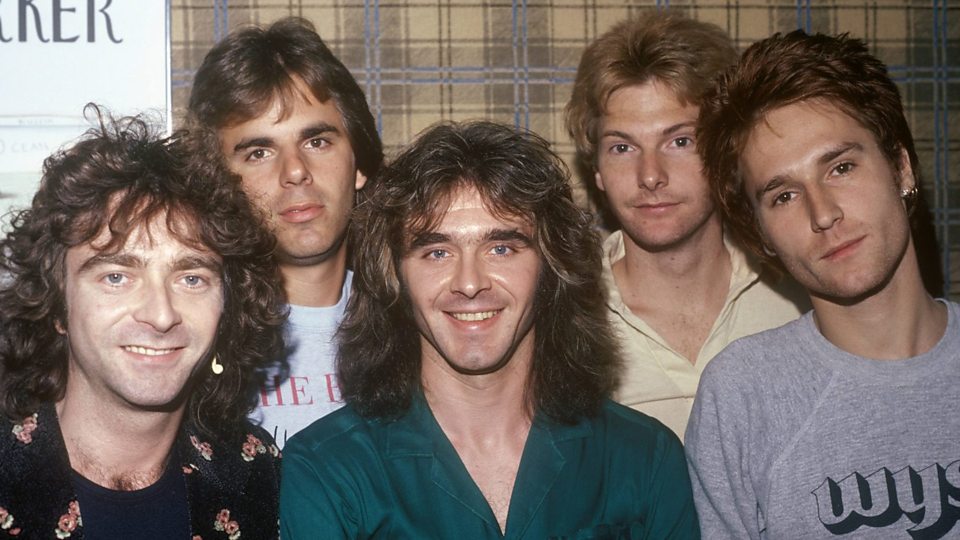
The Babys Mk 2 in 1979, Left to Right, Brock, Jonathan Cain, Stocker, Ricky Phillips & Waite (Photograph pinterest.co.uk).
In early 1979, Corby was replaced by two Americans, keyboard player Jonathan Cain and bassist Ricky Phillips, who freed up John Waite from his bass duties, giving him the freedom to concentrate on lead vocals. The new recruits brought a different dynamic to the group as their next album, Union Jacks, clearly demonstrated. The lush orchestrated passages of the past were gone, replaced by synthesizer stabs and washes from Cain. Keith Olsen, the celebrated producer of Fleetwood Mac, Foreigner and Journey, was also brought in to give the album a radio friendly sheen and punch that the previous three lacked. The overhaul in sound failed to improve their commercial viability, as the single “Back on My Feet Again” just scraped into the US top forty, while “Midnight Rendezvous” only crawled up to seventy-two.



For their swansong, the prophetically titled On the Edge, the band persevered with their new direction on a set of songs that sounded good on the radio but failed to translate into anything close to a hit, as their final single, “Turn and Walk Away”, piqued at number forty-two. By now The Babys were running on empty, frustrated by the stuttering success of their recorded output. It all came to a head after an incident in December 1980 on the opening night of a run of concerts at the New York Palladium. An overzealous fan pulled John Waite off stage, seriously damaging his knee. He was carted off to hospital for treatment. After a prognosis of lengthy rest and recuperation, the rest of the tour was cancelled. It seemed a good time to pull the plug. John Waite went on to a successful solo career scoring a huge hit with “Missing You” in 1984. Jonathan Cain became a long-term member of Journey, and Ricky Phillips did likewise in Styx. In 1987, during downtime in their respective careers, Waite, Cain and Phillips regrouped with former Santana and Journey guitarist Neal Schon and drummer Deen Castronovo in the short-lived rock band Bad English.
At a loose end, Tony toured with the American singer / songwriter Eddie Money for six months, until he received a phone call from Rod Stewart, who wanted him to replace the departing Carmine Appice. Tony took Wally Stocker from The Babys along with him, as Strider’s former guitarist, Gary Grainger, had left Rod to team up with Roger Daltrey, who was pursuing a solo career as a side-line from The Who. The pair joined an existing line-up of former Family guitarist and ex-Poole Grammar school boy Jim Cregan, bassist Jay Davis, Kevin Savigar on keyboards, saxophonist Jimmy Zavala and guitarist Robin Le Mesurier, son of Carry On’s favourite matron Hattie Jacques and John Le Mesurier, Sgt. Wilson of Dad’s Army fame.
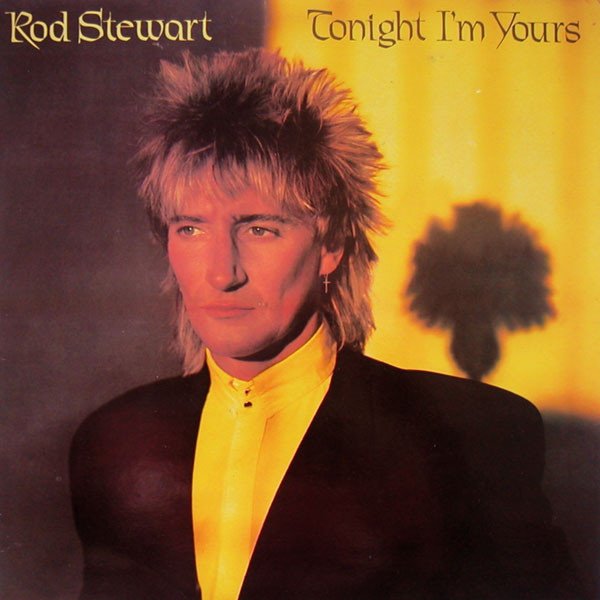

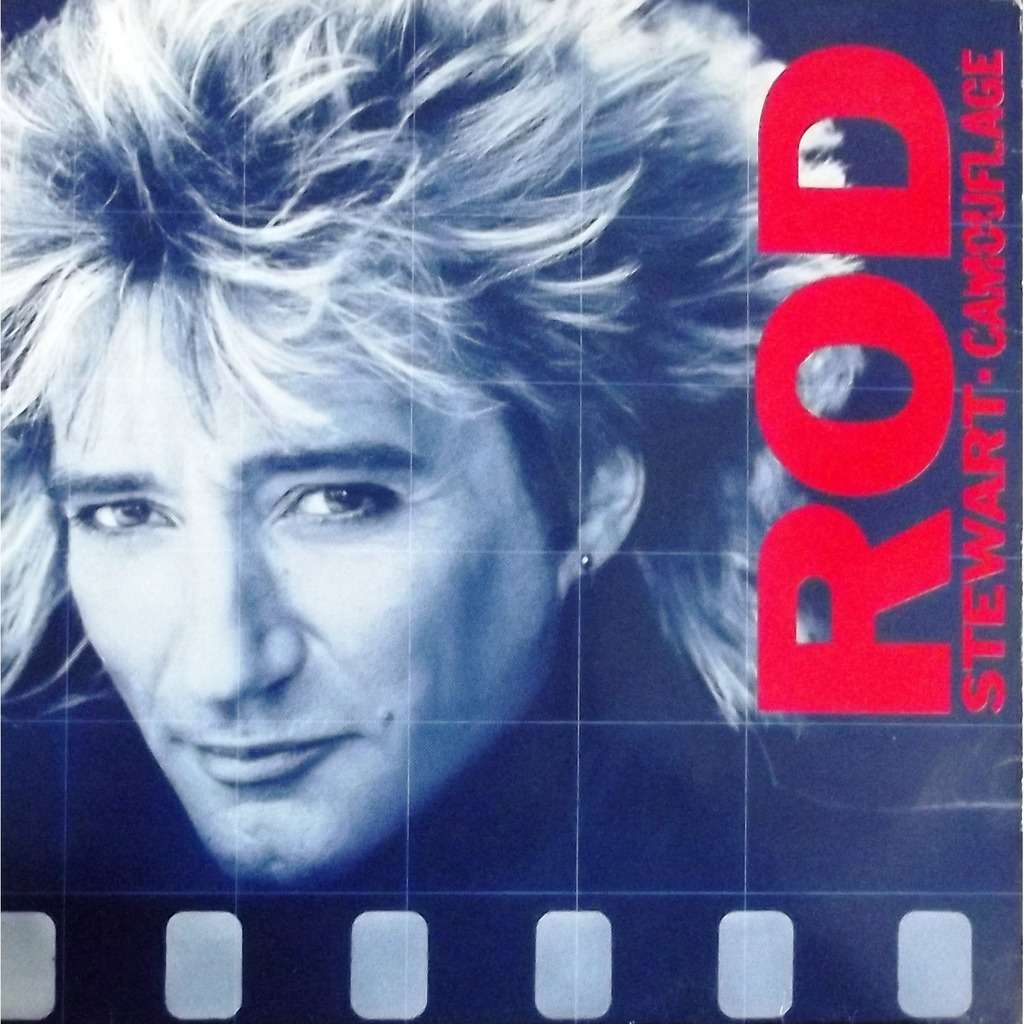
When The Faces broke up in 1975, Rod Stewart‘s solo career took off with the hugely successful Atlantic Crossing, a record that alienated a lot of Rod’s older fans, but gained him a whole legion more. It marked a shift to a slicker sound on his new record label, Warner Brothers, and a change of address from London to Los Angeles to avoid paying a hefty tax bill. By the turn of the eighties Rod was at the height of his powers commercially, his records were shifting by the lorry load and his concerts sold out in minutes, but the critics had their knives out as they had deserted the old guard and lauded the Emperor’s new clothes of New Wave. Stewart probably copped more flack than any other artist, but it has to be said he brought a lot of it on himself because of some lacklustre records and sartorial gaffs of an epic proportion. Who can forget Rod wiggling his spandex encased arse in the video that accompanied his biggest ever selling single “Do Ya Think I’m Sexy”? Not Kenny Everett, whose hilarious sketch lampooned the Scot by miming to the song as he floated skyward, propelled by his ever-expanding buttocks. It succinctly defined a section of the public’s perception of Rod at that moment in time.
By the time Tony joined in 1981, Rod had toned down the outrageous outfits slightly and recorded Tonight I’m Yours, a partial return to form according to some reviews. The album spawned two big hits back home with the title track and “Young Turks” reaching number eight and eleven, respectively. An extensive tour of America and Canada with opening act Tina Turner effectively kick started Turner’s flagging solo career and saved her from a life on the cabaret circuit. After the low key Absolutely Live recorded on the road in California and England, Rod released Body Wishes, a critical failure that produced three consecutive hits with “Baby Jane”, a number one that stayed in the charts for fourteen weeks, “What Am I Gonna Do (I’m So in Love With You)” a number three hit and the less successful, “Sweet Surrender”.
To promote Camouflage, his thirteenth solo outing, Rod invited Jeff Beck along as both support act and side man, after the pair had patched up past differences stemming from their time together in the Jeff Beck Group in the late sixties. In the event, Jeff walked out after the first half dozen concerts, muttering about the “middle aged, blue rinse brigade” that Rod Stewart now attracted. The mammoth tour ploughed on regardless throughout the US and Canada, before calling into Japan and Rio de Janeiro, where they played to over four hundred thousand people over two nights in January 1985. The following month, Rod performed a series of much criticised dates at the Sun City Hotel casino and golf complex in South Africa, at a time when musicians were actively encouraged to boycott the country due to its apartheid policies. The shows landed him on a blacklist drawn up by the United Nations, but it has to be said he was in esteemed company as he joined a veritable who’s who of entertainers including Queen, Elton John, Barry Manilow, The Beach Boys, Dolly Parton, Ray Charles, Johnny Mathis, Julio Iglesias, Liberace and even the Vienna Boys Choir.


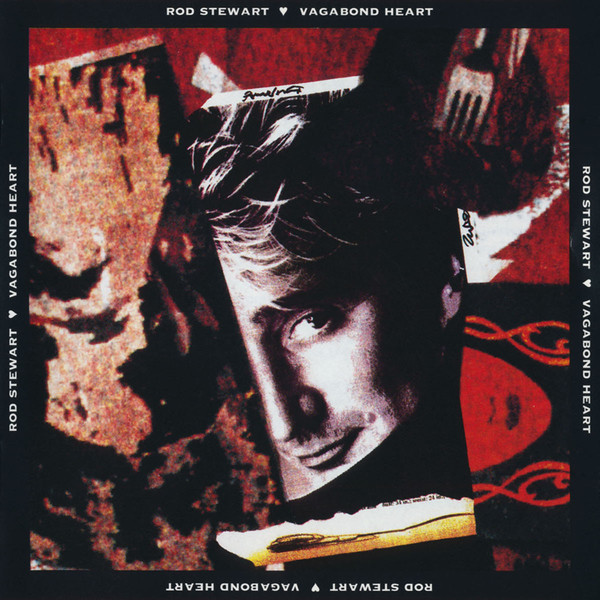
In 1986 Rod returned to Bournemouth for the first time since The Faces farewell tour in 1974, only now the Winter Gardens had been superseded by the much larger, but less atmospheric, Bournemouth International Centre. The homecoming dates for Tony on the 2nd and 3rd November were the penultimate shows of a promotional tour for Every Beat of My Heart, which included huge arena shows throughout Europe and a memorable night at the home of football, Wembley Stadium. Of note on the night, was a brief reunion of The Faces Ron Wood, Kenny Jones, Ian McLagan, an ailing Ronnie Lane who sang harmonies while sat on a chair and the Rolling Stones bassist Bill Wyman, who joined Stewart in a rousing four song interlude that brought the house down. For 1988’s Out of Order, a new manager convinced the singer to instigate a shakeup, resulting in a bruising reshuffle that saw almost his entire touring band replaced, including his long-time friend Jim Cregan. Tony Brock was the only member to avoid the cull.
For the next two years, Rod concentrated on the American and Canadian markets with an enormous tour that paid off dividends in his adopted homeland. One highlight each night featured an extended drum solo during “Do Ya Think I’m Sexy” which Tony milked for all its worth to extract a crowd reaction. In 1991 Rod’s fortunes took a turn for the better globally with the multi-million selling album Vagabond Heart and an inspired cover of Tom Waits “Downtown Train”. However, Tony wasn’t there to share in the success as he only appeared on one track, “You Are Everything”. After nearly twelve years laying down the beat for the Scottish rocker, he left to pursue a career in production, amongst other things, and was replaced by Dave Palmer. Tony has stated he had a ball with Rod Stewart and was always treated as an equal as opposed to a hired hand. The camaraderie and scrapes he experienced were priceless.
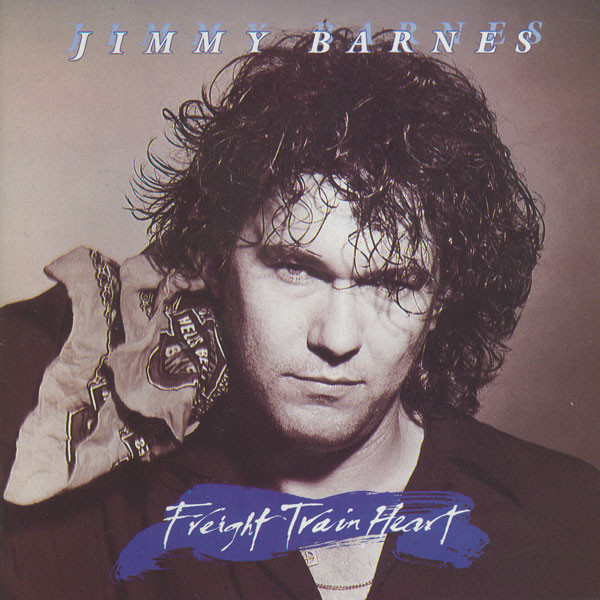


Glasgow born Jimmy Barnes is an Australian icon, and one of their biggest selling rock artists of all time. His family emigrated down under when he was five and he made his name in the seventies with Cold Chisel, a rough-and-ready bar band that championed the working classes while racking up numerous hit singles and albums. Following their breakup in 1984, Barnes continued with a successful solo career, scoring six consecutive number one albums on the Australian charts. For 1987’s Freight Train Heart, Tony was on board through his association with Barnes producer Johnathan Cain, a former member of The Babys and now with Journey. After the sessions were completed, Tony remained with Barnes and became part of his touring set up that recorded the live Barnestorming in December 1987. A show at the Royal Melbourne Showgrounds in February 1988, as part of Australia’s Bicentennial celebrations, featured a plethora of home-grown rock luminaries and a storming drum solo from Tony during Barnsey’s set. For 1990s’ Two Fires, Tony was promoted to associate producer working closely with Don Gehman, producer of John Cougar Mellencamp and REM, a role the pair would reprise on Barnes soul covers album, Soul Deep and two years later on the grungy rock ‘n’ roll stew of Heat. Tony’s contribution to 1993’s Flesh and Wood was minimal because of the stripped down, acoustic nature of the concept. By the following year, the Aussie rocker was living in France due to ongoing financial problems with ANZ Bank and the taxman back home. He took advantage of the situation by undertaking a considerable amount of shows around Britain and Europe to bolster his profile. A live document of one gig appeared as Euro Summer ’94, Tony’s last Jimmy Barnes album.
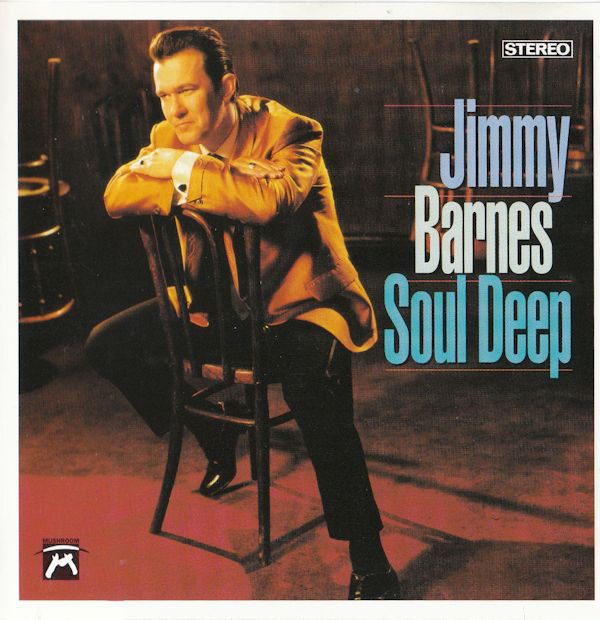


At the turn of the millennium, Tony opened a recording studio in Chatsworth, California, with his installation technician wife, Jan Plott-Brock. A couple of years later, he re-branded the facility Silver Dreams Studios after a song from the second Babys album. Over the years he has worked with Elton John, Bernie Taupin’s Farm Dogs, Primal Scream, Keith Urban and Roy Orbison and has production credits on soundtracks for the TV shows Baywatch and Flipper plus the 1985 comedy movie Just One of the Guys.
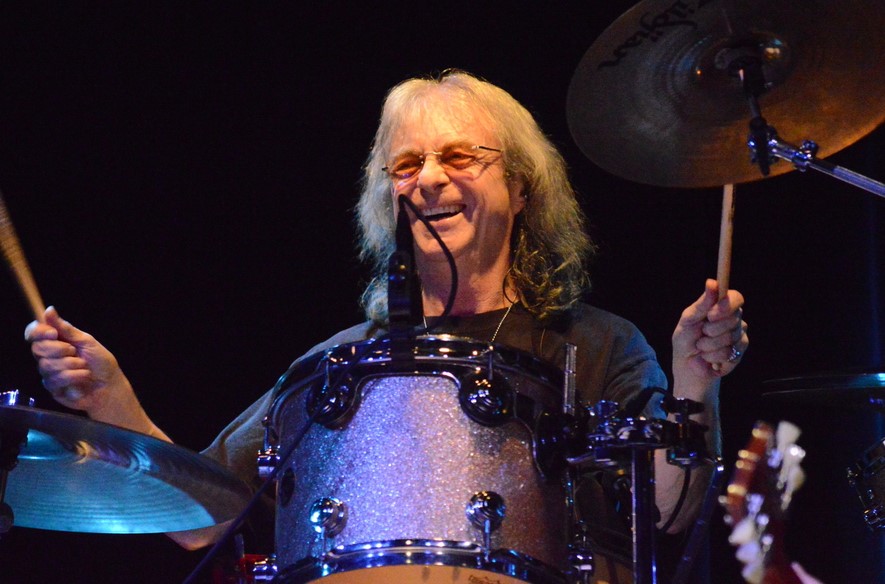
(Photograph Song Seven Photography).
Thirty years after their break-up, Tony and guitarist Wally Stocker brought The Babys back to life with new boys Joey Sykes on guitar and singer / bassist John Bisaha. The quartet recorded an album, I’ll Have Some of That, in 2015 at Silver Dreams, with Tony sitting in the producer’s chair. They undertook a couple of low key shows to test the water before taking the step up to larger venues and festivals. For live shows, Francesco Saglietti beefed up the sound on keyboards and two new Babettes were recruited in Holly Bisaha and Elisa Chadbourne. Tony has been quoted in the press as saying, “We’ve got a silly name, but some great songs,” right on both counts, but it remains to be seen if they can hit the heights of their heyday.
The easiest way to collect The Babys is to buy Silver Dreams: Complete Albums 1976 – 1980 on HNE Recordings released in 2019. The box set brings together all five studio albums with bonus tracks, plus a sixth disc containing a live concert recorded in 1977 and the 1975 Unofficial Babys Album recorded in 1975.

Tony Brock Discography
Singles Spontaneous Combustion
Lonely Singer c/w 200 Lives c/w Leaving: Harvest (HAR 5046) 1971
Gay Time Night c/w Spaceship: Harvest (HAR 5060) 1972
Sabre Dance c/w And Now For Something Completely Different – Sabre Dance: Harvest (HAR 5066) 1973
Rainy Day c/w Chessboard: Harvest (P 3558) 1973 American only release
Albums Spontaneous Combustion
Spontaneous Combustion: Harvest (SHVL 801) 1972
Spontaneous Combustion: Capitol (ST 11021) 1972 American release different sleeve
Triad: Harvest (SHVL 805) 1972
Triad: Harvest (SW 11095) 1972 American release
Spontaneous Combustion / Triad: See for Miles (SEECD 472) 1997 Two for one CD Re-issue
Spontaneous Combustion: Esoteric (ECLEC 2339) 2012 CD Re-issue UK
Triad: Esoteric (ECLEC 2340) 2012 CD Re-issue UK
Single Strider
Seems so Easy c/w Arthur Hydrogen: GM (GMS 23) 1974
Album Strider
Misunderstood: GM (GML 1012) 1974
Singles The Babys
If you’ve Got Time c/w Head above the Waves: Chrysalis (CXP1) 1976
Isn’t It Time c/w Give Me Your Love: Chrysalis (CHS 2173) 1977
Silver Dreams c/w And If You Could See Me Fly: Chrysalis (CHS 2201) 1977
Broken Heart c/w Wild Man: Chrysalis (11 817) 1977
A Piece of the Action c/w Read My Stars: Chrysalis (11 818) 1978
Every time I Think of You c/w Head First: Chrysalis (CHS 2279) 1979
Head First c/w California: Chrysalis (CHS 2323)1979
Back On My Feet Again c/w Turn Around In Tokyo: Chrysalis (100374) 1979
True Love True Confessions c/w Broken Heart c/w Money: Chrysalis (CHS 2398) 1980
Midnight Rendezvous c/w Love Is Just a Mystery: Chrysalis (CHS 2425) 1980
Turn and Walk Away c/w Too Far Gone: Chrysalis (102.610) 1980
Albums The Babys
The Babys: Chrysalis (CHR 1129) 1976
Broken Heart: Chrysalis (CHR 1150) 1977
Head First: Chrysalis (CHR 1195) 1978
Union Jacks: Chrysalis (CHR 1267) 1980
On the Edge: Chrysalis (CHE 1305) 1980
Valentine Baby: Burning Airlines (PILOT 107) 2001 Live Denver 1980
The Babys Anthology: Chrysalis (CHR 1351) 1981 Compilation
I’ll Have Some of That: Something Music (SM 10044) 2015
Singles Rod Stewart
Tonight I’m Yours (Don’t Hurt Me) c/w Sonny: Riva (RIVA 33) 1981
Young Turks c/w Tora, Tora, Tora, (Out With the Boys): Riva (RIVA 34) 1981
How Long c/w Jealous: Riva (RIVA 35) 1982
Baby Jane c/w Ready Now: Warner Bros. (W 9608) 1983
What Am I Gonna Do (I’m So in Love With You) c/w Dancin’ Alone: Warner Bros. (W 9564) 1983
Sweet Surrender c/w Ghetto Blaster: Warner Bros. (W 9440) 1983
Infatuation c/w Three Time Loser: Warner Bros. (W 9256) 1984
Some Guys Have All The Luck c/w I Was Only Joking: Warner Bros. (W 9204) 1984
Love Touch c/w Heart is On The Line: Warner Bros. (W 8668) 1986
Every Beat of My Heart c/w Trouble: Warner Bros. (W 98625) 1986
Another Heartache c/w You’re In My Heart: Warner Bros. (W 8631) 1986
In My Live c/w In My Own Crazy Way: Warner Bros. (W 8489) 1986
Forever Young c/w Days of Rage: Warner Bros. (W 7796) 1987
My Heart Can Tell You Know: Warner Bros. (W 7729) 1987
Albums Rod Stewart
Foolish Behaviour: Riva (RVLP 11) 1980
Tonight I’m Yours: Riva (RVLP 14) 1981
Absolutely Live: Riva (RVLP 14) 1982
Body Wishes: Warner Brother (WEA 92-3877-1) 1983
Camouflage: Warner Brothers (WEA 925-950-1) 1984
Every Beat of My Heart: Warner Brothers (WEA925-446-1) 1986
Out of Order: Warner Brothers (WX 152) 1988
Vagabond Heart: Warner Brothers (WX 408) 1991
Albums Jimmy Barnes
Freight Train Heart: Mushroom (RML 53238) 1987
Barnestorming: Mushroom (TVL 98001/2) 1988
Two Fires: Mushroom (TML 53318) 1990
Soul Deep: Mushroom (TVL 93344) 1991
Heat: Mushroom (TVD93372) 1993
Flesh and Wood: Mushroom (TVD 93390) 1993
Euro Summer ’94: Mushroom (EUROTHANX1) 1995
Albums Featuring Tony Brock
Karla DeVito Wake ‘Em Up In Tokyo: A&M (SP-65048) 1986
Eddie Money No Control: Columbia (FC 37960) 1982
Robert Hazard Darling: RHA Records (RHA 1186) 1986
Primal Scream Give Out But Don’t Give Up: Creation (CRECD 146) 1994
Adrian Gurvitz Acoustic Heart: Explicit (10011-2) 1996
Farm Dogs Last Stand In Open Country: Discovery Records (1046-77046-2) 1996
Elliot Kendall Le Hot Show: Shattered Music (SHA-015) 1997
Farm Dogs Immigrant Sons: Sire (4344-31014-2) 1998
Zoomer Blown: Magnatube Records (30001) 1999
Marcella Detroit Dancing Madly Sideways: Banned Records (R2OSD) 2001
All Wound Up Hero: Tooth and Nail (TND 1197CD) 2001
Zoomer Songs For the Uninvited: One 3 (13-05292) 2002
Road to Blue Richer For Rain: Road to Blue (000280) 2003
Your simply the best , good luck my special friend. Xx
LikeLike
Thanks for you comment Wendy, John
LikeLike
Another favourite of mine, Tony Brock. The Babys’ Golden Mile has probably the best display of precision drumming found on any recording.
LikeLike
Yeah a great drummer and underrated, John
LikeLike
LONG TIME TONY SINCE SGT PEPPERS IN THE SCOOL ROOM EH!
KEITH HARDING THE FLOWER(DUH! PEOPLE ,
GOOD ONE SON ,
LikeLiked by 1 person